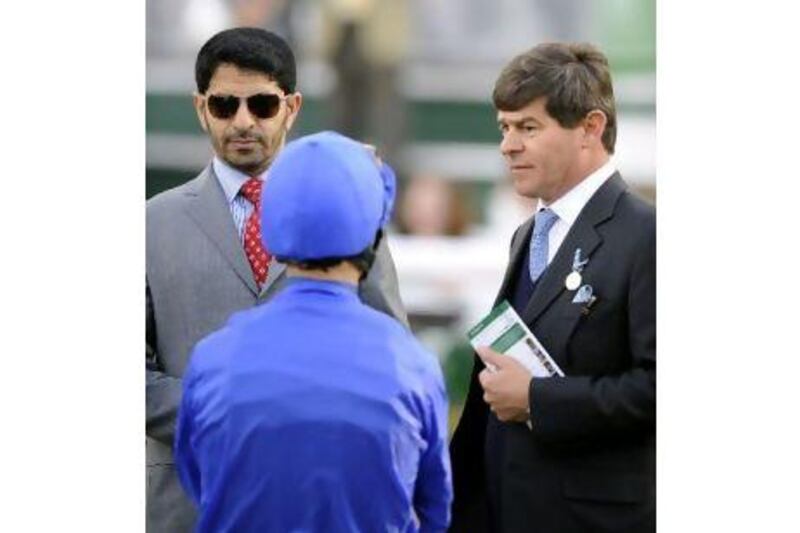LONDON // Britain's revamped elite racing calendar, the British Champions Series, was launched yesterday amid much fanfare but the initiative could pose a serious threat to international racing at the highest level, including in Dubai.
The underlying theme of racing protectionism was impossible to ignore at Newmarket, where the series starts this Saturday with the English Guineas weekend.
Several prominent British trainers warned that forays abroad for highly-rated British horses, such as Presvis, who won Dubai Duty Free on World Cup night, would lessen with the new opportunities afforded by the series.
There were 59 British horses engaged during the Dubai International Carnival this year, and eight horses crossed the Atlantic to compete in America's Breeders' Cup in November.
Former British horses are also regularly bought to be raced in Dubai and in Asia, where the former British-trained Xtension won the Champions Mile in Hong Kong on Monday.
"Britain has a great export market for bloodstock overseas and has been losing these horses for the last 15 years," said Godolphin's Simon Crisford, who underlined the organisation's commitment to the series.
"A lot of our horses are campaigned overseas simply because there aren't the races in England. Owners cannot afford nice colts that are not quite the very best here.
"This series offers a real incentive now for owners to retain their best bloodstock."
Both Henry Cecil, who sent Twice Over to race in the past two Dubai World Cups, and John Gosden, who saddled Dar Re Mi to win last year's Dubai Sheema Classic, concurred.
"We had come to the position where we simply had an amorphous mass of racing," Gosden said.
"We start off with the Guineas meeting in England. We then have the Epsom Derby, Royal Ascot and the summer festivals at Newmarket, Goodwood, York and Doncaster, but suddenly there is this surge of racing around the world that presents huge prize-money and then all of our good horses fly off in all directions.
"We in England have stuck to our traditional structure and we were outmanoeuvred, outflanked and outdated by others, particularly the French.
"British racing was going down one path, not to extinction, but it was getting marginalised at the end of the year.
This series is doing everything to reverse that trend and we do not want to lose our horses abroad."
The Champions Series packages up the elite season into a digestible morsel for not only new racing fans but also the racing landscape around the world.
The series boasts 35 elite races, broken down in to five categories - sprint, mile, middle distance, long distance and fillies and mares - set out over 28 days throughout the season.
The races will be staged in their five categories at 10 English racecourses and there will be £13 million (Dh78.6m) in prize-money on offer.
The season culminates on Champions Day, at Ascot on October 15, when the final of each category will be staged with £3m on offer - the richest card ever staged in the United Kingdom.
A champion jockey and champion trainer will be crowned, and each will receive £25,000 in prize-money which is to be donated to the charity of the winners' choosing.
Television rights will be distributed by BBC Worldwide to around 60 countries throughout the Middle East, Europe, the Americas and Australia.
The Champions Series incorporates 12 of the 20 highest-rated races in the British Flat calendar but only two of the races on Champions Day, the Champions Stakes and the Queen Elizabeth II Stakes, are Group 1 contests.
With all penalties removed from the undercard races, however, there is scope for the races to be upgraded.
The new racing programme has been sponsored for an initial two-year period by Qipco Holdings, a leading private investment company in Qatar owned by six bothers with Sheikh Hamad bin Abdullah Al Thani as the chief executive.
The firm have a diverse range of interests, including real estate, construction, oil and gas as well as Qatar Bloodstock, which owns last year's 2000 Guineas winner, Makfi.
"I am very enthusiastic about racing and this sponsorship is the best way to go forward," said Sheikh Fahad bin Abdullah Al Thani, a nephew of the Emir of Qatar.
"British horse racing is the best around and we are delighted to have this series with us."





